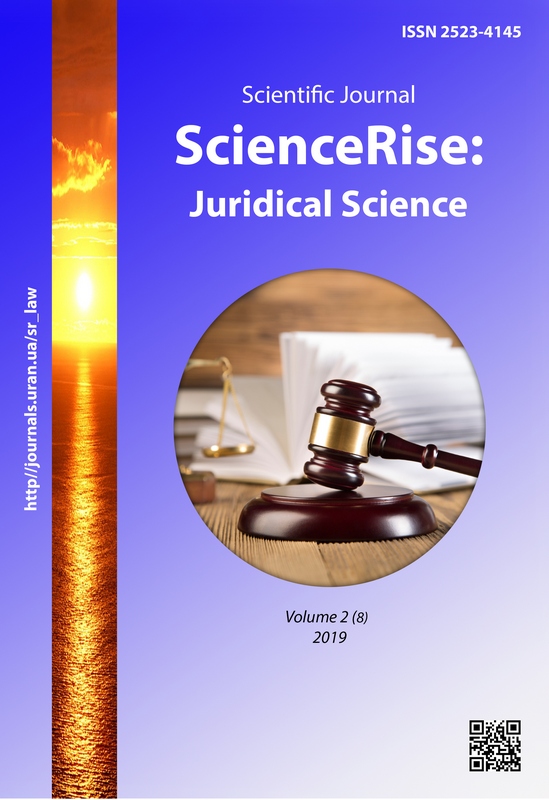Generaltheoretical research of combined legal subjectity
DOI:
https://doi.org/10.15587/2523-4153.2019.172254Keywords:
category «legal subjectity», legal capacity, delictual capacity, active capacity, notion «combined legal subjectity», types of combined legal subjectityAbstract
Combined legal subjectity is the genus of legal subjectity which subjects of law acquire as a result of legitimate filling of gaps in the structure and/or content of their legal subjectity by the relevant parts of the legal subjectity of other persons. According to the author, there are three groups of cases in which the subject of law is forced to attract an external legal-subjectity resource in order to supplement the potential of its own legal subjectity.
The first group should include situations of complete absence or limited presence in the legal subjectity of a social actor of one or more of its structural elements, which are legal capacity, delictual capacity and active capacity. This kind of «combined legal subjectity» is referred to by the author as «structurally-directed» and the model for its shaping is defined as «substitution».Example: involving in the legal subjectity of minor children the active capacity and delictual capacity of their parents.
The second group consists of cases, where the subject of law is fully capable, but for the realization of private interests of the subject and/or fulfillment of certain social functions it`s required the external addition to its subjectity resource. Such legal subjectity arises due to the combination of fragments of legal subjectity of several persons with non-identical legal status and occurs according to the model of «supplement». The author calls this kind as «functionally-directed». Example: using by buyers and sellers of securities of a legal subjectity of licensed securities traders.
The third group consists of cases, when subjects of law attract an external legal subjectity resource in order to overcome mainly geographical, temporary and other actual barriers that make it difficult for them to independently implement their own legal subjectity. The model for shaping of this kind of «combined legal subjectity» is the «combining» and, properly speaking, it can be conventionally referred to as «practically-directed». Example: execution of mandates of foreign courts by Ukrainian courts as well as execution of mandates of Ukrainian courts by foreign courts
References
- Rubanchuk, G. S. (2014). Nedolik tsyvilnoi diezdatnosti fizychnoi osoby: ponyattya, vydy. Naukovyi chasopys NPU imeni Drahomanova. Seria 18: Ekonomika i pravo, 26, 154–161.
- Milash, V. S. (2014). Perspektyvy modernizatsii dohovirnyh pravovidnosyn u sferi hospodariuvannya. Kharkiv: KHNUMG, 227.
- Zubrytska, O. (2015). Administratyvna diezdatnist osoby yak indyvidualnoho subiekta administratyvnoho prava. Naukovyi chasopys Natsionalnoi akademii prokuratury Ukrainy, 3, 36–42.
- Kliuchkovskyi, Iu. B. (2015). Kryterii publichno-pravovoi diezdatnosti hromadianyna. Naukovi zapysky. Iurydychni nauky, 168, 22–28.
- Kachur, V. O. (2010). Pryrodni umovy obmezhennia pravosubiektnosti fizuchnyh osib u Starodavniomu Rymi. Chasopus Kyivskoho Universytetu prava, 3, 8–12.
- Nadon, V. V. (2014). Zahalna kharakterystyka pravosubiektnosti. Aktualni problemy pryvatnoho prava. Kharkiv, 168–172.
- Slabko, S. М. (2016). Sutnist tа zmist pravosubiektnosti liudyny: teoretychnyi, istorychnyi ta mizhnarodnyi aspekty. Molodyi vchenyi, 12.1 (40), 615–618.
- Hospodarskyi kodeks Ukrainy (2003). Vidomosti Verkhovnoi Rady Ukrainy, No.18, No. 19-20, No. 21-22, 144.
- Pundor, Y. O. (2013). Pro neobkhidnist vdoskonalennya u teorii prava klasyfikatsii subiektiv prava z urakhuvanniam potreb haluzevykh teoriiy (na prykladi teorii hospodarskoho prava). Porivnyalno-analitychne pravo, 2, 49–52.
- Garagonych, О. V. (2014). Hospodarska pravosubiektnist investytsiinoho fondu. Porivnyalno-analitychne pravo, 4, 94–98.
- Horbachova, O. O. (2010). Osoblyvosti pravosubiektnosti nederzhavnoho pensiinoho fondu u tsyvilnomu pravi Ukrainy. Chasopys Kyivskoho universytetu prava, 4, 190–194.
- Zelisko, А. V. (2016). Zmist pravosubiektnosti pidpryemnytskykh iurydychnykh osib pryvatnoho prava. Naukovyi visnyk pyblichnoho ta pryvatnoho prava, 4, 19–24.
Downloads
Published
How to Cite
Issue
Section
License
Copyright (c) 2019 Volodymyr Sichevliuk

This work is licensed under a Creative Commons Attribution 4.0 International License.
Our journal abides by the Creative Commons CC BY copyright rights and permissions for open access journals.
Authors, who are published in this journal, agree to the following conditions:
1. The authors reserve the right to authorship of the work and pass the first publication right of this work to the journal under the terms of a Creative Commons CC BY, which allows others to freely distribute the published research with the obligatory reference to the authors of the original work and the first publication of the work in this journal.
2. The authors have the right to conclude separate supplement agreements that relate to non-exclusive work distribution in the form in which it has been published by the journal (for example, to upload the work to the online storage of the journal or publish it as part of a monograph), provided that the reference to the first publication of the work in this journal is included.









